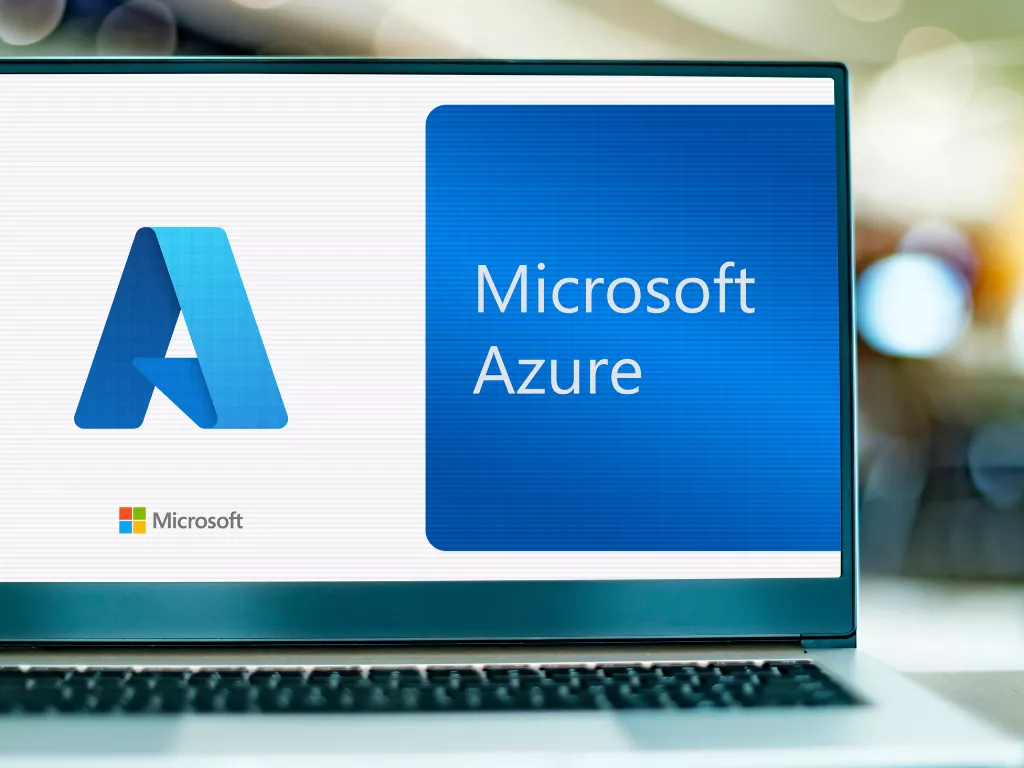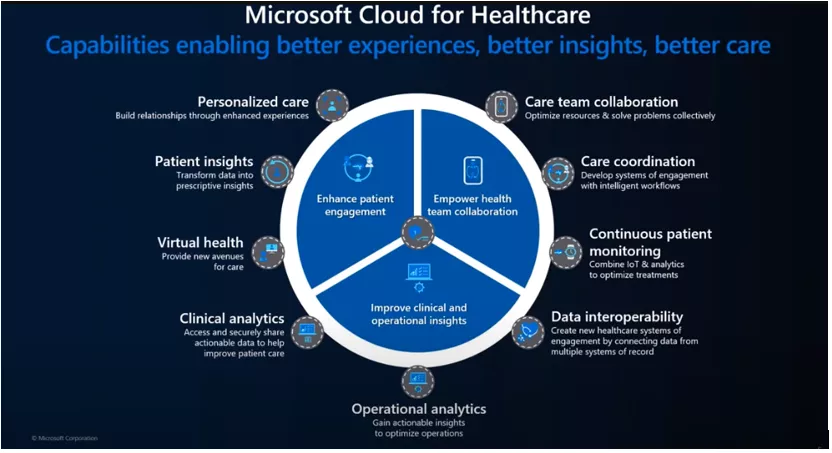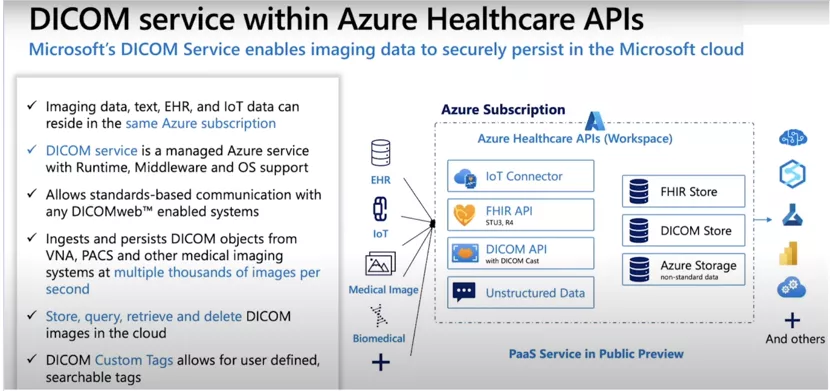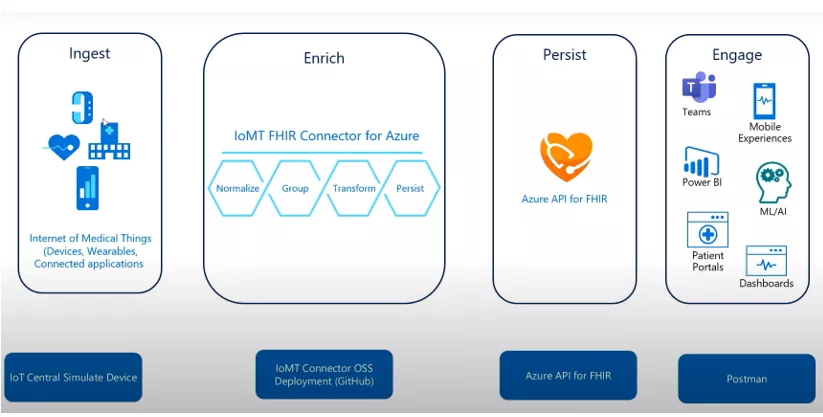Microsoft Cloud Services for Healthcare
What is the need for cloud in healthcare?
Before looking into Microsoft Cloud for healthcare, let’s understand the need for cloud in healthcare.
The integration of healthcare with cloud computing offers several advantages and fulfills various needs for the healthcare industry.

Some of the key reasons for the need of healthcare in the cloud include:
Data storage and accessibility: Cloud computing provides vast and scalable storage capabilities, making it ideal for healthcare organizations to store and manage large volumes of patient data, medical records, images, and other healthcare-related information.
Cost-effectiveness: Cloud computing eliminates the need for expensive on-premises data centers and hardware maintenance. Instead, healthcare providers can opt for a pay-as-you-go model, where they only pay for the resources they use, making it more cost-efficient.
Scalability: Healthcare demands can vary significantly, and cloud computing allows healthcare organizations to easily scale up or down their computing resources based on their needs. This flexibility is particularly valuable for handling sudden spikes in patient data, such as during a pandemic or during peak times of hospital activity.
Collaboration and telemedicine: Cloud-based systems facilitate seamless collaboration among healthcare professionals across different locations. Telemedicine, which relies heavily on cloud-based infrastructure, enables remote consultations, diagnostics, and monitoring, expanding healthcare access to patients in rural or remote areas.
Security and compliance: Reputable cloud service providers implement encryption, access controls, and continuous monitoring to safeguard patient information. Additionally, they adhere to various industry regulations and compliance standards (such as HIPAA for the United States) to ensure data privacy and integrity.
Data analytics and AI applications: Cloud computing enables healthcare organizations to process large volumes of data efficiently. Healthcare data, when analyzed using AI and machine learning algorithms, can provide valuable insights for personalized treatment plans, predictive analytics, disease detection, and drug research.
Disaster recovery and backup: Cloud-based solutions offer robust disaster recovery, backup capabilities, and availability even in the face of a disaster or hardware failure.
Faster innovation and updates: Cloud services provide healthcare organizations with access to the latest technologies, updates, and innovations without the need for extensive on-site hardware upgrades.
Overall, the integration of healthcare with cloud computing addresses various challenges faced by the healthcare industry, offering improved data management, cost-effectiveness, scalability, and security, and enabling advancements in patient care and research.
What are Microsoft Azure Health Data Services?
Microsoft Azure Health Data Services is a Platform-as-a-Service (PaaS) that allows individuals and organizations to manage, upload, store, and analyze healthcare data.
- It is a suite of technologies for protected health information (PHI) in the cloud.
- It is built on global open standards like Digital Imaging Communications in Medicine (DICOM) and Fast Healthcare Interoperability Resources (FHIR).
- Azure Health Data Services workspaces can also be configured with MedTech service, which is used to consume data from IoT/IoMT devices for monitoring, analysis, storage, and reporting of health information
On the internet, you can find a wealth of information regarding Azure Health Data Services. In this article, I have made an effort to compile pertinent and valuable insights.

Image source: Azure Health Data Services - Medical Imaging & DICOM
DICOM
Digital Imaging and Communications (DICOM) is the international standard for medical images and related information. It outlines the formats for medical images that can be exchanged with the data and quality necessary for clinical use.
Applications of Azure DICOM Services
- Analyse patient outcomes: Find and compare outcomes for similar patients and plan treatments or understand options available from this analysis. Physicians can relate patient outcomes and treatment plans for past patients with a similar diagnosis, even when these include imaging data.
- DICOM Image Viewing and Collaboration: Azure DICOM Services offer capabilities for viewing and sharing DICOM images securely. Using web-based viewers and APIs, medical professionals can access and review DICOM images from any device, enabling remote consultations, second opinions, and collaborative workflows. Azure provides features for secure sharing, access controls, and consent management to protect patient privacy.
- DICOM Data Analytics and AI: Azure DICOM Services integrate with other Azure services, such as Azure Machine Learning and Azure Databricks, to enable advanced analytics and AI capabilities on medical imaging data. Organizations can leverage machine learning models for tasks like image classification, segmentation, anomaly detection, and radiomics analysis to derive insights and improve diagnostic accuracy.
- DICOM Data Storage: Azure DICOM Services provide a scalable and secure cloud storage platform for DICOM images. Healthcare organizations can store their medical imaging data, including X-rays, CT scans, MRIs, and ultrasounds, in Azure Blob Storage or Azure Data Lake Storage. The DICOM images can be accessed and retrieved using unique identifiers and metadata associated with each study.
- DICOM Metadata Extraction and Analysis: Azure DICOM Services enable extraction and analysis of metadata embedded in DICOM images. Metadata includes information about the patient, study, series, and imaging modality, among others. By extracting and analyzing DICOM metadata, healthcare organizations can gain insights, perform cohort analysis, and enhance decision-making processes.
- Disaster recovery: DICOM service is designed for high availability. If high availability is implemented in place (in the same region as your primary service) by designing, it as a feature of the primary system.

Image source: Microsoft US Partner Community
IoT in Azure Healthcare Services
Microsoft offers a range of services and solutions that can be utilized in the healthcare industry, including IoT applications. Let's explore some of the ways Microsoft's cloud services can be leveraged for healthcare IoT:
- Azure IoT Suite: Microsoft Azure provides a comprehensive suite of IoT services that can be utilized in healthcare. Azure IoT Hub serves as a central hub for device connectivity, allowing healthcare organizations to securely connect and manage IoT devices such as medical wearables, remote monitoring devices, and healthcare sensors. Azure IoT Central offers a low-code approach to build and manage IoT solutions quickly and easily, enabling healthcare providers to monitor, analyze, and act upon data from connected devices.
- IoT Device Security: Security is critical in healthcare IoT applications. Azure Sphere, a secured, high-level application platform, provides end-to-end security for IoT devices by combining a secured operating system, a microcontroller unit (MCU), and a cloud-based security service. This helps protect connected medical devices from threats and ensures the privacy and integrity of patient data.
- Machine Learning and Predictive Analytics: Azure's machine learning services, such as Azure Machine Learning and Azure Databricks, can be leveraged to build predictive models and perform advanced analytics on healthcare IoT data.
For example, machine learning models can be developed to predict patient deterioration or identify patterns in sensor data that indicate potential health issues. This can aid in early detection, diagnosis, and personalized care.
- Integration with Health Data: Microsoft offers tools and services to integrate healthcare IoT data with other healthcare systems and data sources. Azure API for FHIR enables interoperability and secure exchange of healthcare data using the HL7, FHIR (Fast Healthcare Interoperability Resources) standards. This allows healthcare IoT devices to seamlessly integrate with Electronic Health Record (EHR) systems, telemedicine platforms, and other healthcare applications.
IoMT, what is it?
Internet of Medical Things (IoMT) applies to medical devices and applications with Internet connectivity. It's a subset of the Internet of Things (IoT) and is often referred to as IoT in healthcare. IoMT lets wireless and remote devices securely communicate over the Internet for rapid and flexible analysis of medical data.
What is the difference between IoT and IoMT?
In general Internet of Things (IoT) refers to all Internet-connected devices, like Internet-connected home and factory equipment, biometric scanners, and autonomous farming equipment. IoMT is intended to provide specifications and layouts for healthcare and medical applications. IoMT is designed so that it implements more comprehensive security infrastructure than other IoT systems considering the strict regulations and sensitivity of healthcare data, Azure provides a comprehensive suite of cloud services that can be utilized in the healthcare industry, including applications related to IoT and medical devices.
Remote Patient Monitoring with Internet of Medical Things (IoMT):

Remote Patient Monitoring with Internet of Medical Things (IoMT)
How Microsoft Azure Cloud can play a vital role in healthcare with the help of IoT and IOMT:
• A pipeline from IoMT devices to the Azure API for FHIR can be facilitated by the Azure IoT Connector. It works together with Microsoft's pre-existing IoT platforms such as Azure IoT Central to collect data from devices in remote patient monitoring scenarios, clinical trials, and smart hospitals, and then makes that data FHIR-ready. The data can be viewed with other clinical data sets within the Azure API for FHIR.
• The IoMT FHIR Connector for Azure is easy to configure and can be deployed quickly and enables developers to start managing IoMT data on a FHIR Server.
• Data transformation to the HL7 FHIR R4 Standard
• Query and refine IoMT data in real-time by seamless connectivity with Azure Stream Analytics
• Simpler management of IoMT devices and the capability to scale through Azure IoT services (including Azure IoT Hub or Azure IoT Central)
• Secure management for PHI data in the cloud, the IoMT FHIR Connector for Azure is developed for HITRUST, HIPAA, and GDPR and complies with the protected health information (PHI)
Conclusion:
Microsoft's cloud offerings, particularly through Azure, are playing a significant role in shaping the future of healthcare services. By leveraging the power of the cloud, Microsoft is helping healthcare organizations drive digital transformation, enhance patient care, and address some of the most significant challenges in the healthcare sector.
Decos Expertise and Potential:
Decos is a forward-looking technology company specializing in the development and maintenance of sophisticated software applications for medical devices. Our team's expertise uniquely positions us to harness the power of cutting-edge solutions such as Microsoft Cloud for Healthcare and Azure IoT Suite, with the intent of establishing innovative infrastructures for remote patient monitoring and diagnosis within hospital settings.
With a profound understanding of software development intricacies within the medical sector, we recognize the immense potential that lies in leveraging the services offered by Microsoft Cloud for Healthcare. An exemplary use case entails the establishment of comprehensive remote patient monitoring and diagnosis systems, crucial in today's healthcare landscape. Our proficiency in crafting tailored applications for medical devices ensures seamless integration and implementation of such solutions, yielding enhanced patient care and diagnostic accuracy.
Notably, the synergy between our capabilities and the Azure IoT Suite enables us to envision a landscape where IoT-enabled medical devices take center stage, catering to a myriad of applications across the healthcare spectrum. This potential for innovation, coupled with our commitment to excellence, positions Decos as a prominent player in reshaping the healthcare technology landscape.
This blog is written by Romesh Kapoor, Senior .NET developer at Decos. He has worked in developing various web and desktop applications and is a cloud enthusiast.
Decos is a cutting-edge technology services partner ready to meet your software needs in the medical domain. If you have a question on one of our projects or would like advice on your project or a POC, just contact Devesh Agarwal. We’d love to get in touch with you!

Discover more

